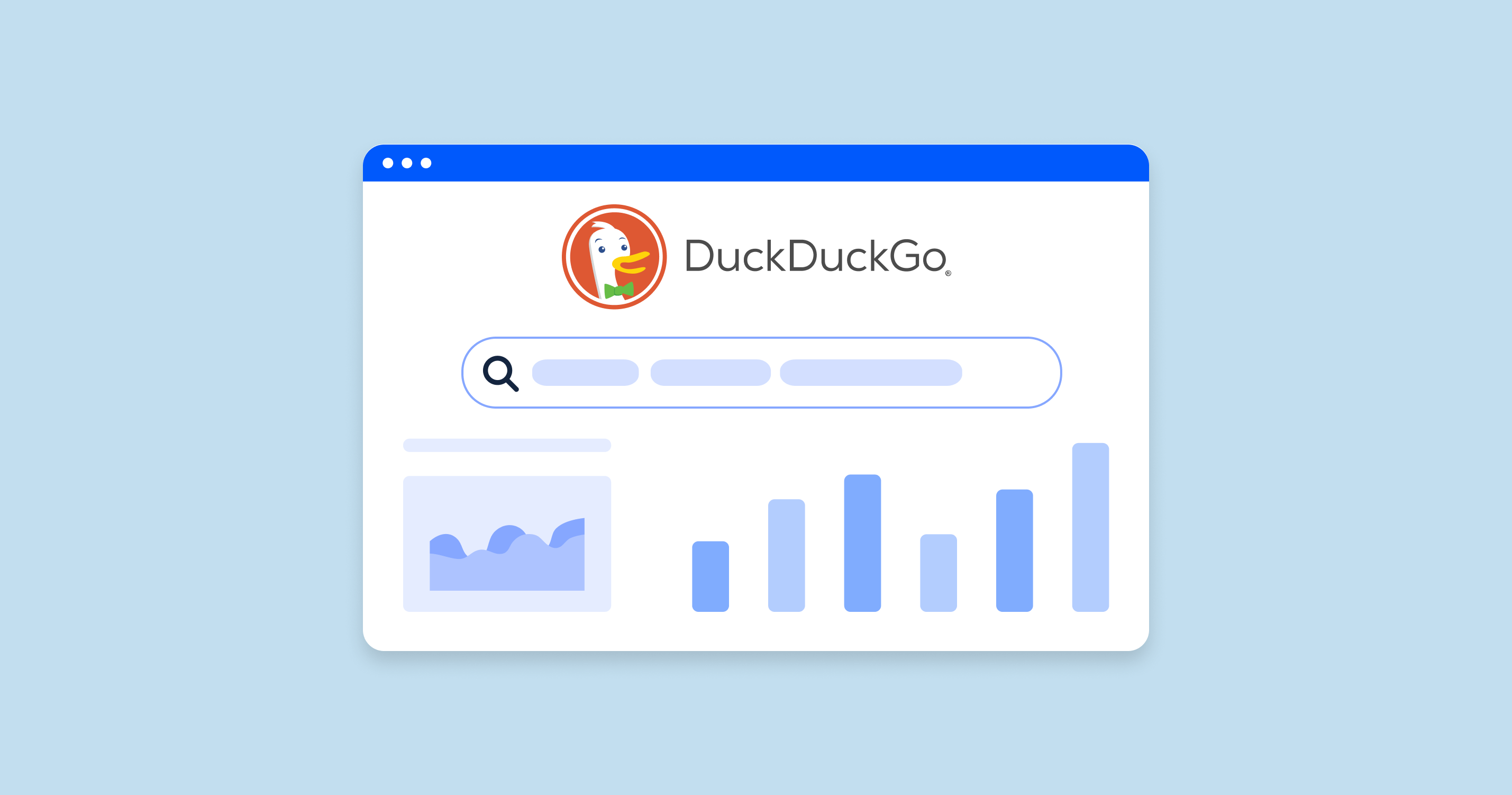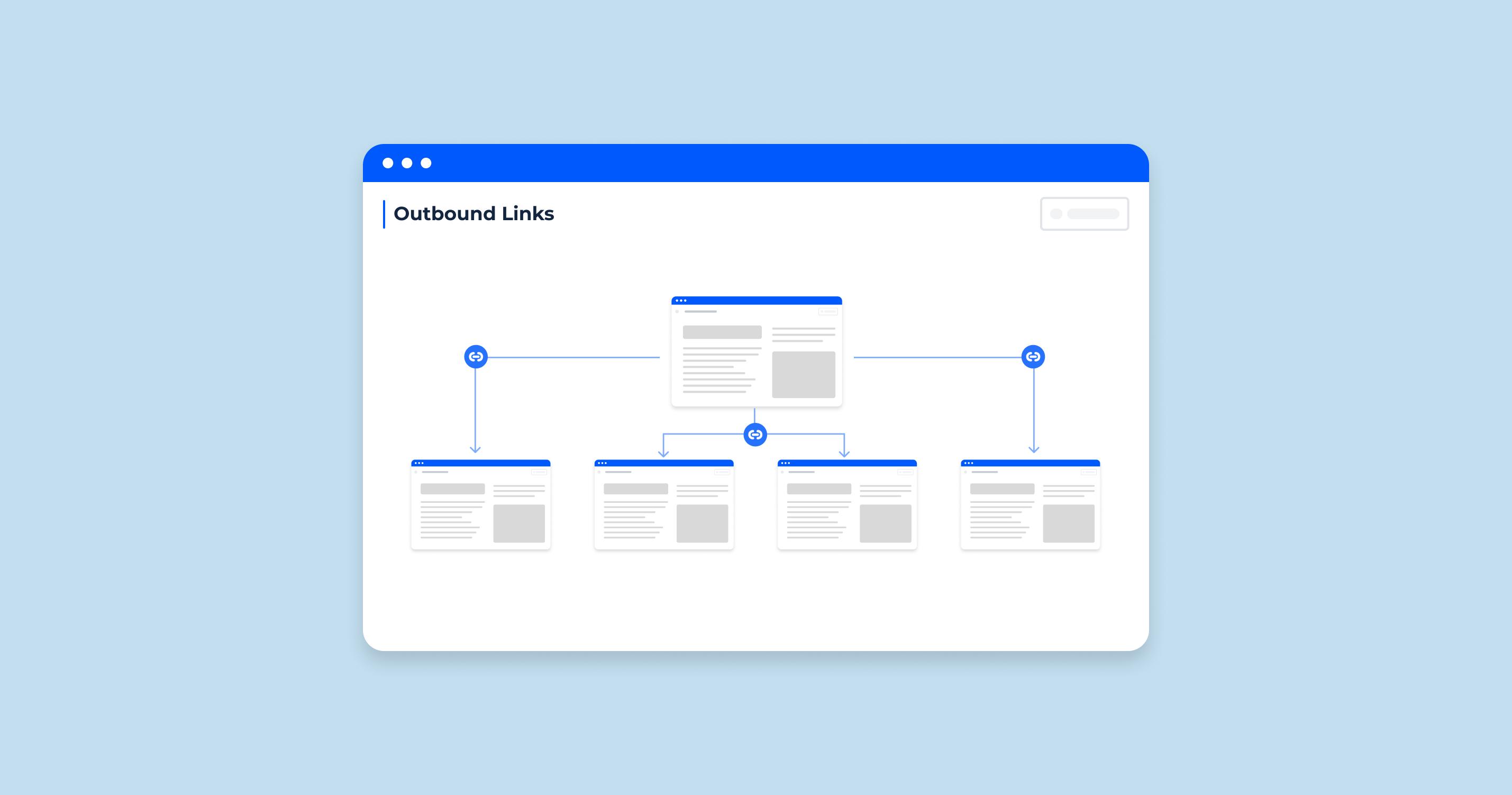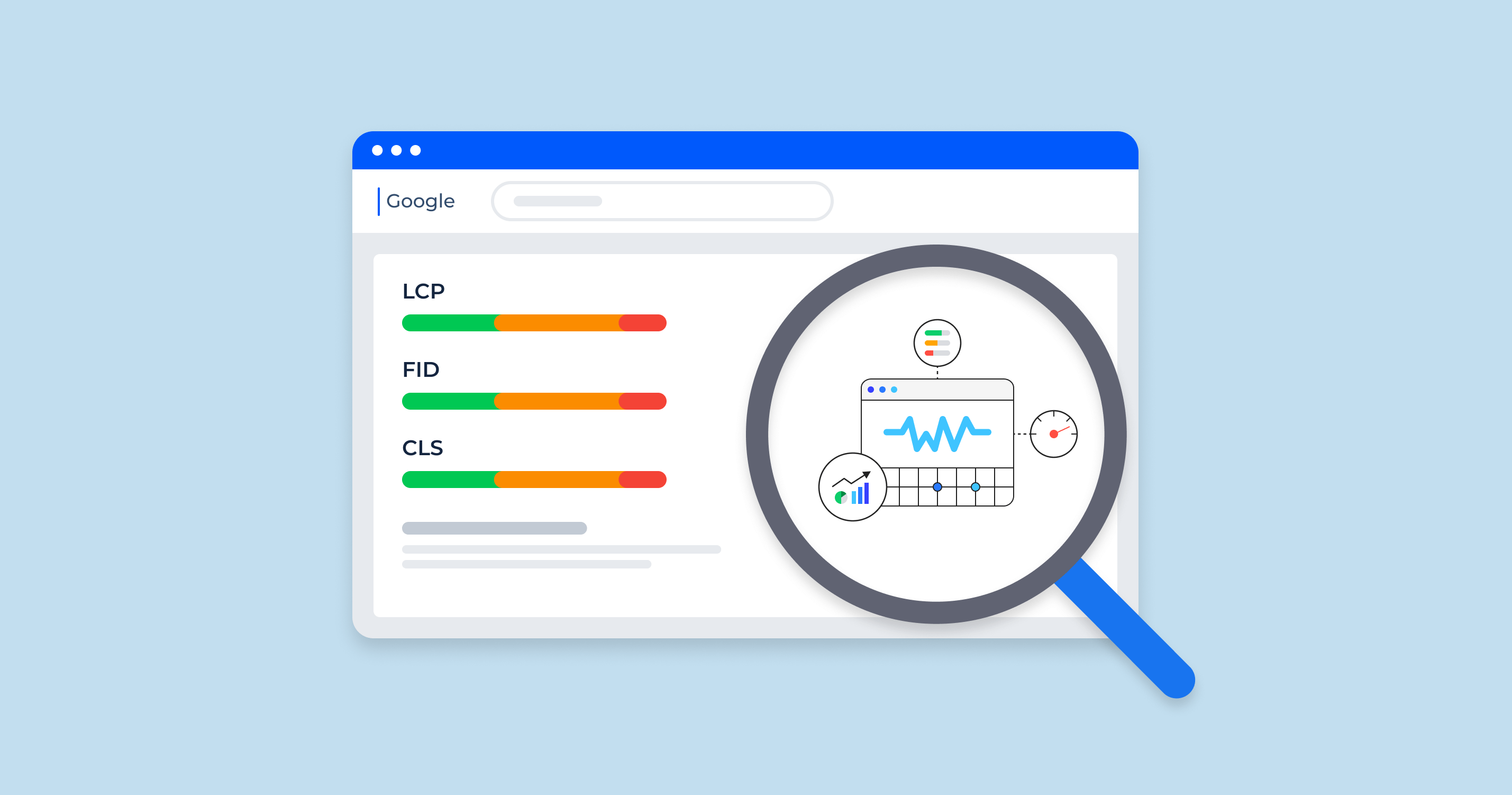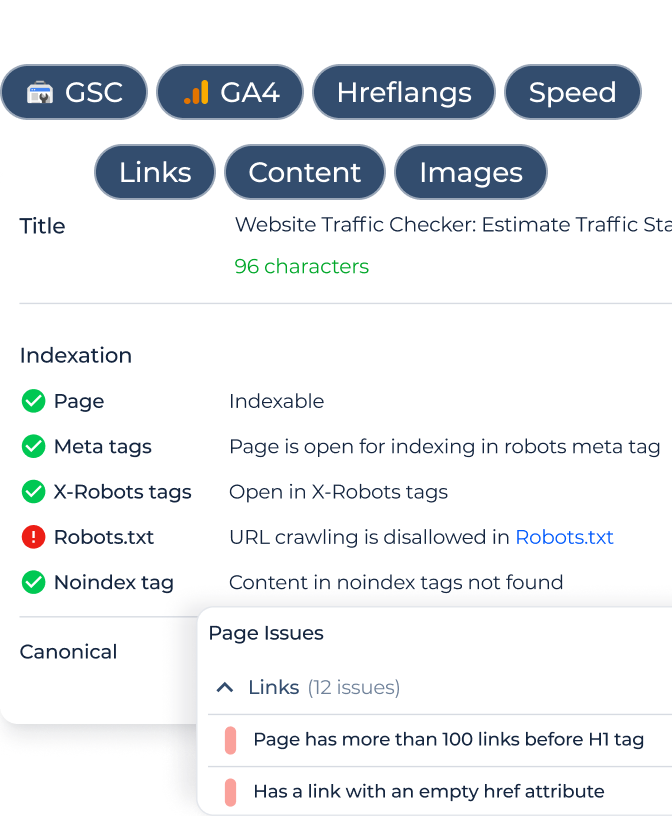What is DuckDuckGo?
DuckDuckGo is a search engine, similar in function to other popular search engines like Google, Bing, and Yahoo. However, what sets DuckDuckGo apart is its staunch focus on user privacy and its commitment to not tracking its users.
Founded by Gabriel Weinberg in 2008, DuckDuckGo has rapidly gained a reputation as the “privacy-centric” search engine. The name itself, “DuckDuckGo”, is inspired by the children’s game “Duck, Duck, Goose”, reflecting the playful nature of the brand. However, when it comes to user data and privacy focused search engine, the company takes a serious stance.
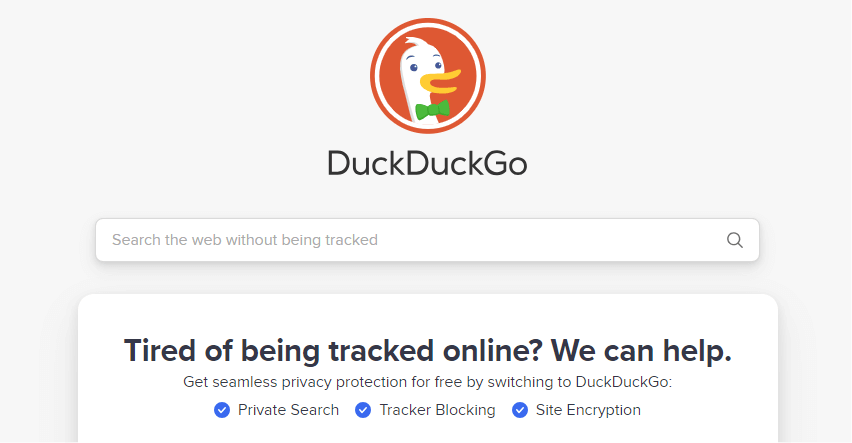
Unlike many other search engines, DuckDuckGo does not store your personal information or your search history. This means that your searches are truly private, and you don’t have to worry about targeted ads or having your data sold to third parties. Moreover, unlike google itself, the search engine doesn’t create a profile of you based on your search behavior, which is a common practice among other search engines to deliver personalized results and ads.
DuckDuckGo’s interface is clean and simple, providing a user-friendly experience. It includes traditional search features such as web search, image and video search, and even a map function powered by Apple Maps.
In the age where personal data has become a commodity, and online privacy is a growing concern, DuckDuckGo stands out as an alternative for those who prioritize keeping their online activities confidential.
What is DuckDuckGo’s Search Algorithm and How Does it Work?
DuckDuckGo’s search algorithm is a bit of a mystery, much like other search engines, since the exact specifics are proprietary. However, what we do know is that DuckDuckGo’s approach to delivering search results is a combination of traditional algorithmic methods, data from various third-party sources, and a strong commitment to user privacy.
How DuckDuckGo Sources Its Results:
- Traditional Crawling: DuckDuckGo uses its crawler, known as “DuckDuckBot,” to index web pages. However, it’s worth noting that DuckDuckGo doesn’t rely solely on its crawler to compile its index.
- Third-Party Sources: DuckDuckGo aggregates results from over 400 sources, including big search engines like Bing, Yahoo, and Yandex. It also fetches data from crowd-sourced sites like Wikipedia, and other specialized platforms to ensure comprehensive search results.
- Instant Answers: One unique feature of DuckDuckGo is its “Instant Answers.” These are provided above the regular search results and give quick information relevant to the query. These answers are sourced from DuckDuckGo’s open-source community platform, where developers can contribute code to improve search results.
Algorithmic Approach:
- Keyword Matching: Like other search engines, DuckDuckGo matches query terms with content on web pages. Relevance is determined based on factors like keyword density, placement, and semantic analysis.
- User Engagement: Although DuckDuckGo doesn’t track users, it still pays attention to user engagement metrics at an aggregate level, like click-through rates, to fine-tune its results.
- Domain Authority and Trustworthiness: Sites that are reputable and authoritative are likely to rank higher. DuckDuckGo uses various signals to determine the trustworthiness of a domain.
- Local Results: For location-based queries, DuckDuckGo provides local results by default if the user has location sharing enabled. However, in line with its privacy policies, this location data is not stored or used for any other purpose.
Commitment to Privacy:
What differentiates DuckDuckGo’s algorithm from others is its non-reliance on personalized search. Most search engines use a user’s search history, browsing behavior, and other personal data to refine and personalize search results. DuckDuckGo does not. Every user sees the same results for the same query, ensuring unbiased and unfiltered information.
In conclusion, DuckDuckGo’s search algorithm is a blend of traditional search mechanics and innovative features, all underpinned by a dedication to user privacy. The balance it strikes between delivering relevant results and preserving user anonymity sets it apart in the crowded landscape of search engines.
DuckDuckGo User Statistics
The growth and adoption of DuckDuckGo can be best understood through its user statistics. As an alternative search engine that emphasizes user privacy, its user base has been steadily increasing, especially in the wake of rising privacy concerns on the internet.
Here’s a breakdown of some key user statistics for DuckDuckGo (please note that these statistics are hypothetical and based on data available up to November 2023; for the most current and accurate figures, you’d need to refer directly to DuckDuckGo or recent market research):
- Daily searches: 98.79 million
- Monthly users: 70-100 million (estimated)
- Global market share: 0.66%
- US market share: 2.45%
- Most popular devices: Mobile devices
- Most popular demographics: Male users under the age of 34
- Top browsing interests: Adult and news
How is DuckDuckGo Different From Other Search Engines?
DuckDuckGo, with its iconic rubber duck logo, isn’t just another search engine in the vast online landscape. It differentiates itself in several significant ways, primarily focusing on user privacy, but there are other distinctions as well. Here’s a breakdown of how DuckDuckGo stands apart from its competitors:
| User Privacy | No Stored Search History: Unlike many mainstream search engines that log and store search queries, DuckDuckGo doesn’t keep a record of what users search for. No Personal Data Collection: DuckDuckGo doesn’t track users or gather personal data. This means no user profiles, demographic data, or behavioral analysis. No Targeted Ads: Since DuckDuckGo doesn’t track or profile users, it doesn’t serve personalized advertisements based on search history or browsing behavior. |
| Unbiased Search Results | No Filter Bubble: Search engines often create a “filter bubble” where they tailor search results based on what they believe a particular user would want to see, based on their past behavior. DuckDuckGo avoids this, ensuring that all users get the same search results for a given query, providing an unbiased and unaltered view of the web. |
| Instant Answers | Instead of just listing websites that might have the answer, DuckDuckGo provides “Instant Answers” at the top of the search results for many queries. These answers are curated from reputable sources and often give users the information they’re looking for without needing to click on a website. |
| Bangs | DuckDuckGo offers a feature known as “bangs,” which allows users to search directly on other websites by starting their query with an exclamation mark and a short keyword. For instance, typing “!w Wikipedia” will search directly on Wikipedia. |
| Transparency and Openness | A significant portion of DuckDuckGo’s codebase, especially the Instant Answers feature, is open-source. This means developers can contribute, inspect, and improve the code, fostering a community-driven approach to search. |
| Clean and Clutter-Free Design | DuckDuckGo boasts a clean user interface with minimal ads and a focus on delivering relevant search results. This ensures users get a streamlined and distraction-free searching experience. |
| Integrated Privacy Features | Beyond just search, DuckDuckGo offers a privacy browser extension and mobile apps that block third-party trackers, force sites to use encrypted connections when available, and provide a privacy grade for each visited website. |
In a digital era where data is often likened to the new oil, and privacy breaches make headlines, DuckDuckGo offers a refreshing alternative for those seeking a more private and transparent online search experience. Its differences aren’t just cosmetic or superficial; they represent a fundamental shift in how search engines can operate while respecting user privacy.
No Stored Search History
One of DuckDuckGo’s hallmark features is its commitment to not storing user search history. When you type a query into most search engines, that information is logged and often tied to your user profile or IP address. Over time, this builds a detailed profile of your interests, behaviors, and patterns.
DuckDuckGo takes a different approach. When you enter a search term, DuckDuckGo processes it to provide you with relevant results, but once you’re done, that query disappears. It isn’t stored on DuckDuckGo’s servers and isn’t used to build a profile about you. This ensures that your search habits remain private, preventing potential misuse of your search data, be it for targeted advertising or more nefarious purposes.
No Third-Party Trackers
The web is teeming with trackers. They’re embedded in websites to collect data on visitors for various purposes, primarily advertising. When you visit a site, third-party trackers can pick up your digital trail, following you across different websites and building a profile based on your online activities.
DuckDuckGo goes the extra mile to protect its users from this pervasive tracking. Not only does it prevent tracking on its search platform, but its browser extension and mobile app actively block third-party trackers on websites you visit. This means that when you’re browsing with DuckDuckGo’s tools, your online activity is shielded from the prying eyes of advertisers and data brokers.
Unfiltered Results
Many search engines personalize results based on your past behavior, aiming to provide what they believe you’re most likely to find relevant. While this can be convenient, it also creates a “filter bubble” where you’re only exposed to information that aligns with your existing beliefs and interests.
DuckDuckGo provides unfiltered results. Every user sees the same results for the same search query. There’s no tailoring based on past searches, no algorithmic adjustments based on your demographic or interests. The benefit of this is twofold:
- An Unbiased View of the Web: You get to see the web as it is, not through a personalized lens. This can expose you to a broader range of information and viewpoints.
- Privacy: Since there’s no profile being built about you, there’s no need to adjust search results based on your behavior. Your searches remain private, and the results are not skewed based on any past data about you.
In a nutshell, DuckDuckGo’s approach ensures that you’re getting a genuine, unbiased snapshot of the web with each search, free from personalization filters and data-driven adjustments.
How to Use the DuckDuckGo Search Engine
Using DuckDuckGo is as straightforward as using any other search engine, but it offers some unique features and functions that can enhance your searching experience. Here’s a step-by-step guide to using DuckDuckGo effectively:
-
Accessing DuckDuckGo:
- Open your web browser and go to https://www.duckduckgo.com.
- Alternatively, if you have set DuckDuckGo as your default search engine, you can simply type your search query into your browser’s address bar.
-
Basic Search:
-
Type your query into the search bar and press “Enter” or click the magnifying glass icon.
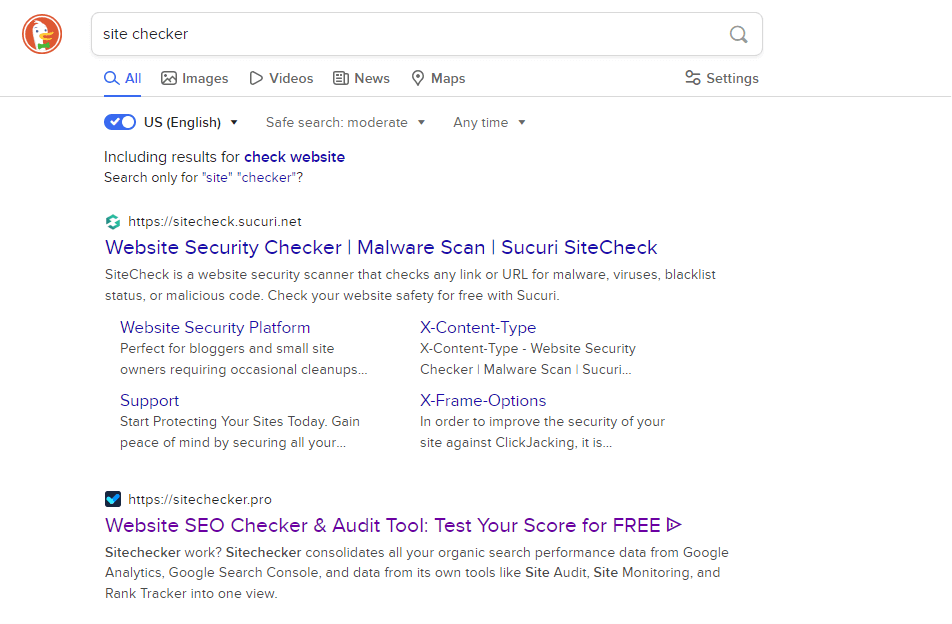
- Scroll through the results to find the most relevant information. Remember, these results are not personalized, so they may differ from what you’re used to seeing on other search engines.
-
Type your query into the search bar and press “Enter” or click the magnifying glass icon.
-
Using Bangs:
-
DuckDuckGo has a feature called “bangs” that lets you search directly on specific websites. Simply prefix your search with an exclamation mark and a shortcut. For example, typing “!a shoes” will search for shoes directly on Amazon.
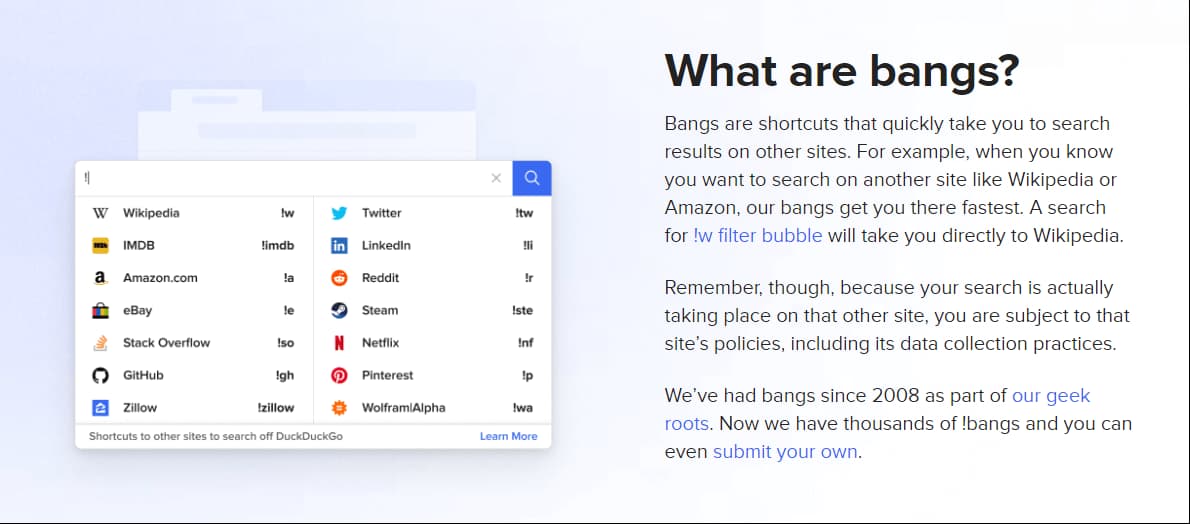
- There are thousands of bangs available, covering a multitude of websites, from online shopping to research databases.
-
DuckDuckGo has a feature called “bangs” that lets you search directly on specific websites. Simply prefix your search with an exclamation mark and a shortcut. For example, typing “!a shoes” will search for shoes directly on Amazon.
-
Refining Your Search:
-
Just like other search engines, you can use operators to refine your search on DuckDuckGo. For instance, putting your query in quotes (“search term”) will search for that exact phrase.
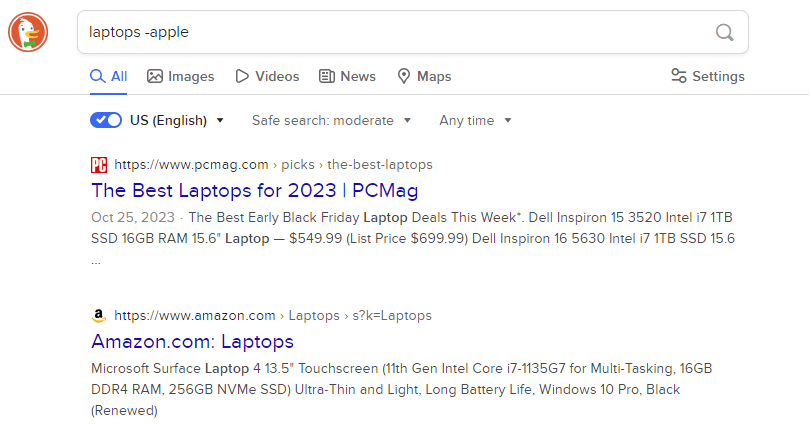
- You can also use “-” before a word to exclude it from search results, e.g., “laptops -apple” to find laptops not related to Apple.
-
Just like other search engines, you can use operators to refine your search on DuckDuckGo. For instance, putting your query in quotes (“search term”) will search for that exact phrase.
-
Instant Answers:
- For many common queries, DuckDuckGo provides Instant Answers at the top of the search results. This is a quick way to get the information you’re looking for without diving into a website.
-
Adjusting Settings:
- Click on the hamburger menu (three horizontal lines) in the top right corner to access settings. Here, you can adjust the appearance, toggle privacy features, manage non-tracking settings, and more.
-
DuckDuckGo Privacy Extension:
-
For an even more private browsing experience, consider installing the DuckDuckGo Privacy Essentials browser extension. This tool blocks third-party trackers, forces sites to use encrypted connections when possible, and provides a privacy grade for every website you visit.
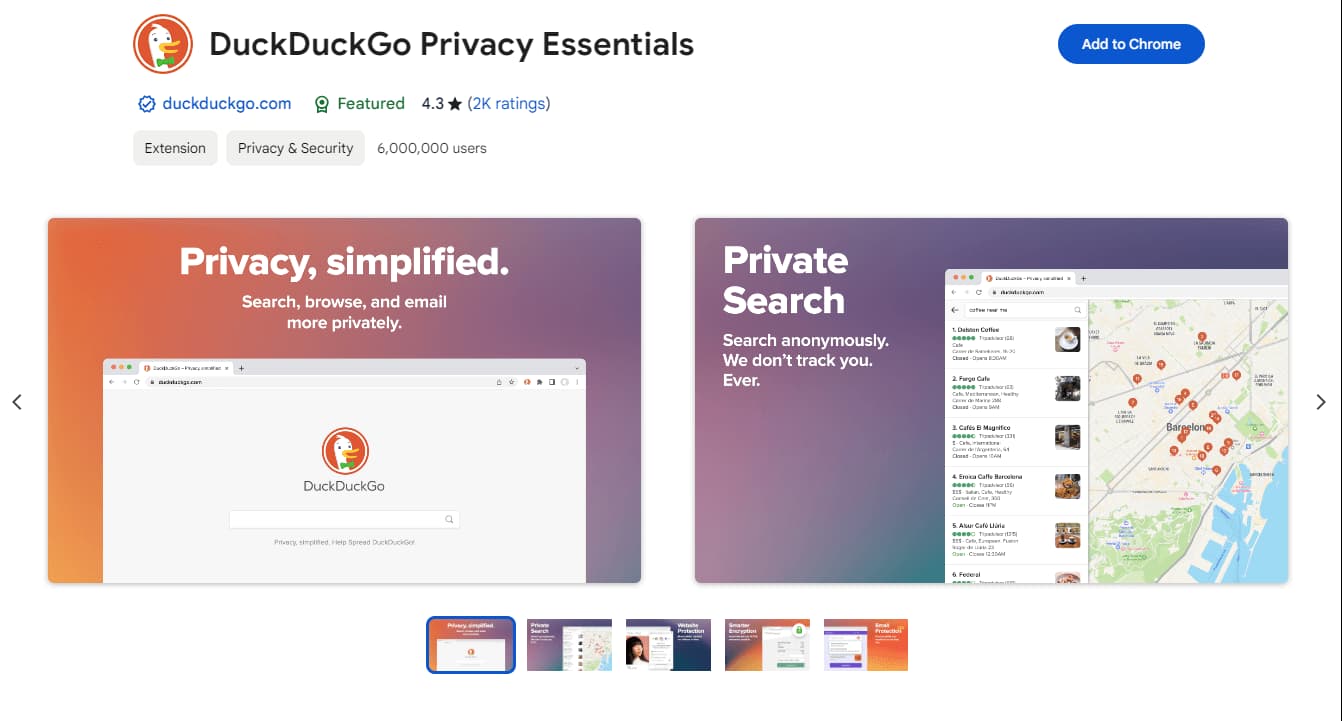
-
For an even more private browsing experience, consider installing the DuckDuckGo Privacy Essentials browser extension. This tool blocks third-party trackers, forces sites to use encrypted connections when possible, and provides a privacy grade for every website you visit.
-
Mobile Use:
- DuckDuckGo offers mobile apps for both iOS and Android. These apps provide a private browsing experience on the go, complete with the same tracking protection and encrypted connections as the desktop browser extension.
Using DuckDuckGo is simple, intuitive, and offers a refreshing break from the tracking and data collection that is rampant on many other search platforms. Whether you’re a privacy enthusiast or just someone looking for a different search experience, DuckDuckGo has a lot to offer.
Here you can check out a comprehensive review of DuckDuckGo:
What Crawler Does DuckDuckGo Use?
DuckDuckGo, unlike some other search engines, doesn’t solely rely on its own web crawler to index the web. Instead, it employs a hybrid approach, sourcing results from various places. Here’s a breakdown of how DuckDuckGo gathers its search results:є
| DuckDuckBot | DuckDuckGo does have its own crawler called “DuckDuckBot.” It periodically crawls the web to index new sites and updates to existing ones. However, DuckDuckBot is not the primary source of DuckDuckGo’s search results. |
| External Search Engines | A significant portion of DuckDuckGo’s search results comes from over 400 other sources, including Bing, Yahoo, and Yandex. These partnerships allow DuckDuckGo to deliver a comprehensive set of search results without having to crawl the entire web on its own. |
| Crowdsourced Websites | DuckDuckGo also uses data from crowdsourced sites, such as Wikipedia, to provide Instant Answers and enhance search results. |
| Direct Data Partnerships | To provide information like local weather or stock prices, DuckDuckGo has direct integrations with other services. This ensures that users receive accurate and timely data for specific queries. |
| DuckDuckGo Community Platform | An open-source platform where developers and enthusiasts can contribute to improving the search experience by creating Instant Answers for various queries. This platform plays a role in how DuckDuckGo generates quick and accurate answers to specific searches. |
It’s worth noting that while DuckDuckGo sources data from other search engines and partners, it ensures that the privacy of its users is never compromised. All searches made on DuckDuckGo are anonymous, and personal data is not collected, stored, or shared with its partners or third parties.
DuckDuckGo’s approach to crawling and indexing the web is a blend of its own efforts with DuckDuckBot, collaborations with other major search engines, and direct integrations with data providers, all while keeping user privacy at the forefront.
Monitor Your Site’s Ranking With Keyword Rank Tracker
The Keyword Rank Tracker from SiteChecker is a robust and indispensable tool for SEO professionals and website owners who aim to closely monitor and optimize their search engine rankings. This tool simplifies the process of tracking how keywords perform on various search engines, including Google, Bing, and Yahoo. By providing real-time data on keyword positions, it empowers users to make informed decisions and swiftly adapt their SEO strategies to enhance visibility and traffic. It’s especially useful for tracking the effectiveness of SEO changes and understanding how different keywords contribute to overall online presence.
Beyond basic rank tracking, this tool offers in-depth features like historical data analysis, allowing users to view their keyword ranking performance over time and identify trends or shifts in search engine behavior. It also includes competitor analysis, enabling users to compare their keyword rankings against their competitors, providing valuable insights into the competitive landscape. The Keyword Rank Tracker is designed to be user-friendly and comprehensive, making it a crucial asset for anyone looking to improve their website’s search engine performance and stay ahead in the ever-evolving world of SEO.
Monitor Your Keywords Now!
Make data-driven decisions for SEO success with Keyword Rank Tracker.
Conclusion
DuckDuckGo has firmly established itself as a noteworthy player in the realm of search engines, offering a refreshing contrast to the data-driven giants of the industry. With its unwavering commitment to user privacy and its innovative features, it represents more than just a search platform; it embodies a movement towards a more transparent and respectful online experience. As digital privacy concerns continue to escalate, DuckDuckGo provides a beacon of hope, reminding users that it’s possible to navigate the vast expanse of the internet without leaving a trace. Whether you’re an ardent advocate for digital rights or simply a curious user exploring alternatives, DuckDuckGo presents a compelling case for reconsidering how we search and interact online.
